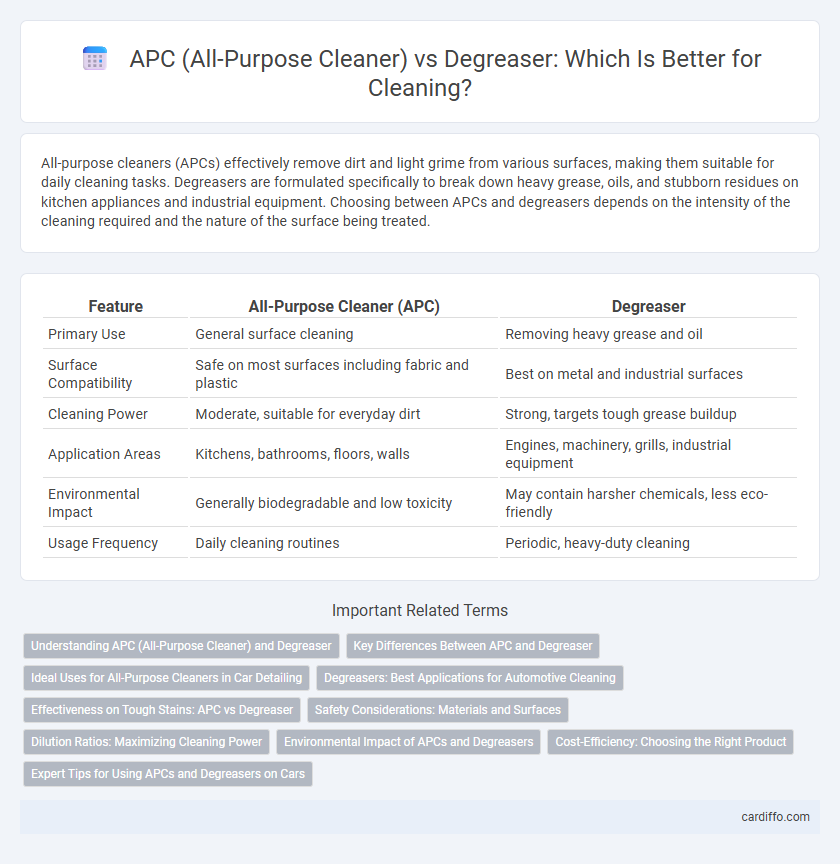All-purpose cleaners (APCs) effectively remove dirt and light grime from various surfaces, making them suitable for daily cleaning tasks. Degreasers are formulated specifically to break down heavy grease, oils, and stubborn residues on kitchen appliances and industrial equipment. Choosing between APCs and degreasers depends on the intensity of the cleaning required and the nature of the surface being treated.
Table of Comparison
| Feature | All-Purpose Cleaner (APC) | Degreaser |
|---|---|---|
| Primary Use | General surface cleaning | Removing heavy grease and oil |
| Surface Compatibility | Safe on most surfaces including fabric and plastic | Best on metal and industrial surfaces |
| Cleaning Power | Moderate, suitable for everyday dirt | Strong, targets tough grease buildup |
| Application Areas | Kitchens, bathrooms, floors, walls | Engines, machinery, grills, industrial equipment |
| Environmental Impact | Generally biodegradable and low toxicity | May contain harsher chemicals, less eco-friendly |
| Usage Frequency | Daily cleaning routines | Periodic, heavy-duty cleaning |
Understanding APC (All-Purpose Cleaner) and Degreaser
All-purpose cleaners (APCs) are versatile cleaning agents formulated to remove dirt, grime, and light stains from a variety of surfaces, making them ideal for daily household or commercial cleaning tasks. Degreasers contain stronger solvents designed specifically to dissolve and break down heavy grease, oil, and stubborn residues commonly found in automotive, industrial, and kitchen environments. Understanding the chemical composition and intended use of APCs versus degreasers ensures effective cleaning by selecting the appropriate product for either general cleaning or heavy-duty grease removal.
Key Differences Between APC and Degreaser
All-purpose cleaners (APCs) are formulated for general surface cleaning, removing dirt, grime, and light grease from a variety of materials like countertops, floors, and walls. Degreasers target heavy-duty grease, oil, and stubborn residues, making them ideal for automotive, industrial, or kitchen environments with intense buildup. While APCs offer versatility with mild to moderate cleaning power, degreasers contain stronger solvents and surfactants designed to break down tough oily contaminants efficiently.
Ideal Uses for All-Purpose Cleaners in Car Detailing
All-purpose cleaners (APCs) in car detailing excel at removing dirt, grime, and light stains from various surfaces like upholstery, plastics, and carpets without causing damage. They are ideal for routine interior cleaning tasks that require versatility and gentle formulation, ensuring safe use on sensitive materials. While degreasers target heavy oils and grease on engine bays and wheels, APCs offer effective, balanced cleaning suitable for broad interior and exterior applications.
Degreasers: Best Applications for Automotive Cleaning
Degreasers excel in automotive cleaning by effectively breaking down heavy oils, grease, and grime commonly found on engines, transmissions, and undercarriages. Their powerful chemical formulations target stubborn contaminants that all-purpose cleaners often fail to remove, ensuring a thorough cleanse without damaging sensitive metal or plastic components. Using a degreaser enhances maintenance routines by improving engine performance and preventing corrosion through comprehensive debris removal.
Effectiveness on Tough Stains: APC vs Degreaser
Degreasers outperform APCs in dissolving and removing tough, greasy stains due to their formulation with stronger solvents targeting oils and grease. APCs offer versatility for general dirt and grime but may struggle to eliminate heavy buildup compared to degreasers designed specifically for stubborn, oily residues. For persistent tough stains, degreasers provide superior cleaning power and faster results in industrial and household applications.
Safety Considerations: Materials and Surfaces
All-purpose cleaners (APCs) are formulated to safely clean a variety of surfaces including painted walls, plastic, and glass without causing damage, making them suitable for everyday cleaning tasks. Degreasers contain stronger solvents designed to break down heavy oils and grease typically found on machinery or kitchen appliances but may damage sensitive materials such as rubber, painted surfaces, or untreated wood. When selecting between an APC and a degreaser, it is essential to consider the surface type and material compatibility to avoid discoloration, corrosion, or surface degradation.
Dilution Ratios: Maximizing Cleaning Power
APCs (All-purpose cleaners) typically require dilution ratios ranging from 1:10 to 1:64 depending on the cleaning task, balancing cleaning power and surface safety. Degreasers often demand stronger dilutions, such as 1:5 to 1:20, to effectively break down heavy grease and oil residues. Optimizing dilution ratios enhances cleaning efficiency, minimizes chemical waste, and prolongs surface integrity while ensuring maximum cleaning performance.
Environmental Impact of APCs and Degreasers
All-purpose cleaners (APCs) generally contain biodegradable surfactants and lower concentrations of volatile organic compounds (VOCs), resulting in reduced environmental harm compared to degreasers that often include stronger solvents and harsher chemicals. Degreasers typically have a higher environmental impact due to the presence of petroleum-based solvents, which contribute to air pollution and water contamination. Selecting eco-friendly formulations with green certifications can mitigate the ecological footprint of both APCs and degreasers during cleaning tasks.
Cost-Efficiency: Choosing the Right Product
All-purpose cleaners (APCs) offer versatile cleaning capabilities suitable for a wide range of surfaces, making them cost-efficient for general maintenance and routine cleaning tasks. Degreasers, designed to tackle heavy grease and oil buildup, provide targeted strength that reduces cleaning time and product usage in industrial or kitchen environments. Selecting the right product based on specific cleaning needs maximizes cost efficiency by minimizing waste and optimizing labor efforts.
Expert Tips for Using APCs and Degreasers on Cars
APCs (All-purpose cleaners) effectively remove dirt and light grime from car surfaces without damaging paint or trim, making them ideal for general cleaning tasks on wheels, interiors, and engine bays. Degreasers contain stronger solvents designed to break down heavy grease, oil, and road grime, particularly useful for engines and heavily soiled undercarriages. Experts recommend applying APCs at a diluted ratio for safe use on delicate surfaces and reserving degreasers for stubborn grease, always testing products on small areas to avoid damage.
APC (All-purpose cleaner) vs Degreaser Infographic

 cardiffo.com
cardiffo.com